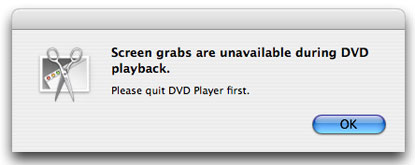Recently, I had the need to capture a still from a DVD a Persuasive Games client had sent over as guidelines for some game assets. I didn’t want to rip the whole DVD, so I went to use the built-in screen capture facility in Apple OS X: the old standby Command-Shift-3. I was surprised to see the following result.

The operating system knows when the DVD Player that ships with the computer is running, and when it is the OS disables the screen capture facility. Maybe this is old news, but I hadn’t noticed it before, probably because I don’t tend to take film stills for my writing or research. When I started searching the web for information, I found that a lot of other people were confused about it. I use Windows only for QuickBooks and VisualStudio, but it turns out Microsoft’s built-in Media Player has the same limitation.
Workarounds are simple enough; a third-party program like Snapz Pro ($69) or DVD Capture (free) work around the limitation to make screen caps of DVDs easy. There’s also a simple console hack. But that’s not the point. Rather, what struck me is the fact that Apple had encoded a position on fair use into their product.
And that’s exactly what they had in mind. According to a San Francisco Chronicle Q&A on the topic from five years ago, Apple has taken an explicitly legal position on the matter:
You’ll need some third-party software … because none of Apple’s screen-copying routines (including Mac OS X’s Grab utility) will capture anything from a DVD. According to Apple spokeswoman Alicia Awbrey, that’s because “we designed the DVD player so one cannot grab the frame from the screen. This is part of our ongoing commitment to being a responsible player in the digital content era and protect intellectual property rights.”
Film stills have been a controversial topic in fair use copyright law for some time. Society for Cinema and Media Studies has published an extensive opinion on the matter. Even though that group’s interests lie primarily in commentary and educational fair use, the group reports that “the legal status of reproductions of frames has remained problematic.” Indeed publishers take widely varying positions on fair use tolerance for film stills printed in books, newspapers, and magazines. The Library of Congress has even issued an exemption that allows educators to create digital clips from legally-obtained DVDs for use.
Interestingly, I had no trouble whatsoever taking a capture of a TV show I’d purchased from Apple’s iTunes Store. Here it is below, from the finale of Hell’s Kitchen.

Apple has also begun to sellDRM-free music in iTunes Store, thus allowing the excerpting of audio and music files for other (legal) purposes. Of course, in both these cases one has to pay Apple for the privilege by acquiring the assets through their channel. Insert a DVD you bought from Amazon.com or rented from Blockbuster and fair use stills are verboten.
In my contract for Persuasive Games, I asked that the press treat screenshots of early videogames as fair use. The rest I acquired or bought rights for (thanks to a small army of student volunteers). Nick and I asked for the same treatment for Video Computer System. When it came time to submit images for my piece in the forthcoming MacArthur Series on Digital Media and Learning title Ecology of Games, I found that publisher was willing to treat all game stills as fair use.
Copyright law is set as much by practice as it is by legal action, and the more groups that support the fair use of stills in film and games, the more momentum will develop around the idea. That’s not the same as legal precedent, but it’s something. Film critics and scholars have often settled for publicity stills provided by the studios (some still demanding payment for their use). These stills are often taken on set by still cameras, not from the view on the celluloid. Likewise, game publishers also provide promotional stills too, and it is often unclear if they are in-game realtime renders or pre-rendered stills meant to make the product look better than it actually does. In both cases, these images often do not meet the specific illustrative needs of the writer.
I’m sure Apple and Microsoft don’t have the obligation to provide tools to make DVD still capture easy. After all, it’s much more challenging to capture a good-quality screen from a console-exclusive videogame (video out to PC HD input?), or from a regular DVD player for that matter. But I’m surprised to see them explicitly make it so hard. And I’m equally surprised to see so few discussions about the implications. My searches revealed dozens of solutions, workarounds, hacks, and third-party tools to overcome the limitation, but not a single discussion of it’s legal, cultural, or moral status.
Comments
Jason Mittell
Ian – another great example of how code can supplant law, per Lessig. I’m on the SCMS subcommittee that’s drafting an update to the fair use statement to account for digital transformations, as well as expand to teaching & other modes of presentation – anyone reading this can contact me with concerns that they believe should be addressed by such guidelines & recommendations. Promoting open discussion about these limitations, workarounds, and the legal/cultural/moral status are crucial to getting the topic on the agenda for policy makers and shifting the terms of the debate where all copying is assumed to be piracy.
(And I personally use & recommend SnapZPro for this function – and lobby any presses I work with to view all screen caps in support of critical commentary as fair use.)
Mark Nelson
I think part of it is that the people who would be most vocally against these sorts of restrictions on DVDs have long ago written off the entire “official” DVD industry, including Apple, as anti-consumer and anti-fair-use, so they/we longer really pay attention to any of this, since we already use VLC, Xine, or mplayer, or just avoid DVDs entirely.
No screenshots is just one of many insults in that broken-by-design format; I was personally driven off by the unskippable advertisements.
Ian Bogost
Jason, thanks for the additional information. Just a day or two after I wrote this, a huge thread erupted on the DiGRA listserv about fair use for game screenshots. I am hoping that organization will take the lead of SCMS and work on the fair treatment of rights for games.
A question I asked there: is there any public record of university presses with a good history of treating screenshots/stills as fair use?
Petri Lankoski
Microsoft seem to be bit inconsistent in their fair use policies. On the other hand, MS is actively preventing fair use in their products and in other fronts their are defending (their) fair use rights. (e.g., MS is part of CCIA, which have launched http://www.defendfairuse.org/ and filed complaint for fair use).
Mark Nelson
A few statements from university press higher-ups suggest an openness to film stills:
A 1998 mailing list post from the Director of Production and Electronic Publishing at Temple University Press points approvingly to an article that argues film stills are fair use.
A 2005 address by the Director of Penn State University Press reads in part, “we fully support ‘creative’ fair use (though we probably have not been aggressive enough in exploring its limits, as with the use of film stills, for instance)”.
I don’t know how either publisher follows through in practice, but the latter comment in particular seems to indicate a willingness on PSU Press’s part (at least at the top) to be more open to the idea than they have been in the past.
Mark Nelson
Petri: Unfortunately Microsoft seems to really slant more towards the other side. While they’re a member of CCIA, they tend to release press releases saying something like “although we’re CCIA members, we think the CCIA is wrong on this issue and have no part in this action” whenever CCIA does anything pro-fair-use (or pro-consumer in general). For example, here’s their latest one (August 2007), in which they state that they’re opposed to that FTC complaint you linked to.
insombisp
Hello!
I am selling a political yard sign I found on the side of the road on E-Bay. I’ve got bidders. What’s the dumbest thing you’ve bought/sold on E-bay?
JinsCusisulty
Prompt meet, what antivirus is better?
How do you use?